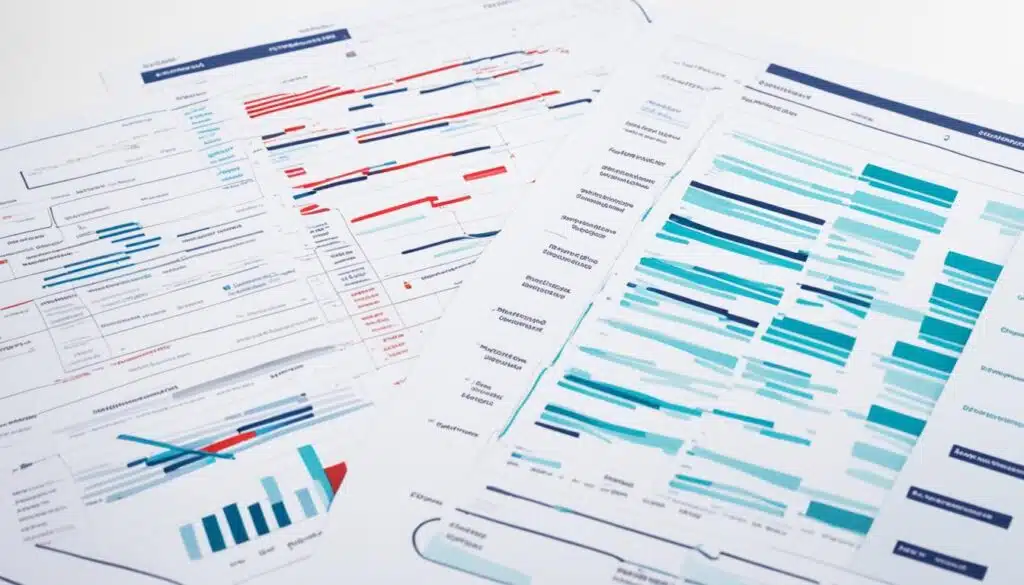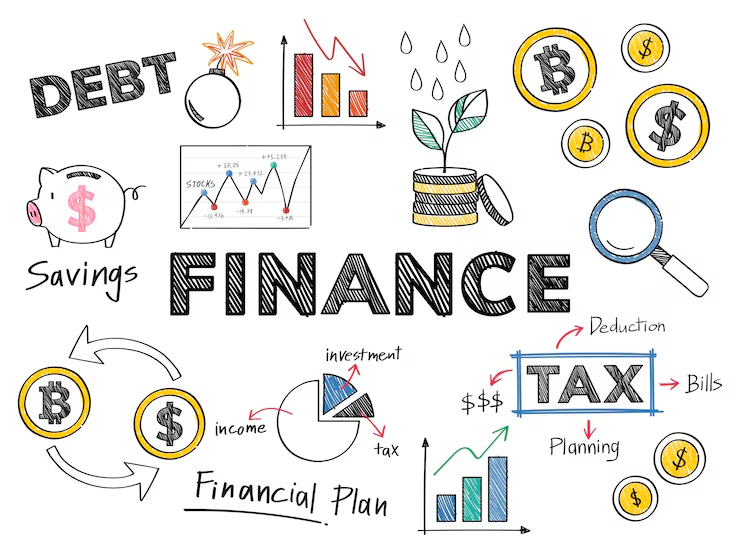The finance and banking industry open doors to many job options. It’s perfect for those wanting a career shift or starting a new job. The CFI Career Map shows what different jobs in finance and banking are like. This helps people find their best career path, whether moving up or setting off for the first time. The map talks about job duties, what you need to know, how much you can earn, and the courses you might take for success.
There’s a lot to do in the finance and banking world. It sorts jobs into four groups: buy-side, sell-side, client-facing, and transaction-focused. By exploring these categories, you can find out what skills and knowledge you need for each job type.
Key Takeaways
- The finance and banking industry offers a diverse range of job opportunities, including roles in investment banking, financial planning, corporate finance, and more.
- The CFI Career Map provides insights into various finance careers and the skills required for success.
- Finance jobs can be categorized into four main types: buy-side, sell-side, client-facing, and transaction-focused.
- Exploring the different finance job types can help individuals identify their ideal career path.
- Understanding the job duties, qualifications, and compensation factors is crucial for navigating the finance industry.
Introduction to the Finance Industry
The finance industry is exciting and full of opportunities. It includes jobs like investment banking, portfolio management, and financial consulting. These areas give a wide variety of job options. They connect those who have money to invest with those who need funding to reach their goals. This is called the financial system.
Diversity of Finance Careers
The finance world offers many different career paths. You can work in data science, research analysis, risk management, and more. This sector also covers investment banking, stock trading, and private equity. There’s a job for every skill in finance.
Overview of the Financial System
The financial system is at the heart of finance. It helps money move from savers to spenders through services. The investment management industry is a big part of this system. It helps manage money, making various types of investments. These financial services are vital for business strategy, managing risks, and ensuring ethical practices.
Buy-Side vs. Sell-Side Finance Jobs

The finance industry splits into two sectors: buy-side and sell-side. The buy-side involves big investors like pension plans. They invest in many things, from stocks to real estate. The sell-side creates and sells securities, offering investment services.
Buy-Side Roles
On the buy-side, firms manage assets for others, like pension funds. Those who work there look into investment chances, build portfolios, and make sure money is well spent. Jobs include portfolio managers who decide where to invest, investment analysts who study what to buy, and risk managers who keep investments safe.
Sell-Side Roles
At the sell-side, companies like investment banks help businesses and investors. They give advice, help with raising money, and handle trades. This side involves creating and selling financial products. It includes investment bankers, research analysts, and traders.
Front, Middle, and Back Office Finance Jobs
The finance industry breaks down into three main areas: front, middle, and back office roles. Each area has a different focus, which is key to understanding the many finance jobs you can find.
Front Office Responsibilities
The front office is all about making money directly from clients. It includes roles like trading, portfolio management, sales, and customer service. People in these jobs interact with clients daily. They share investment tips, handle trades, and offer one-on-one financial help. To succeed, they need to know a lot about financial markets, products, and rules. Great people skills are also a must.
Middle Office Roles
The middle office supports the front office’s work. It covers things like risk management, information technology, corporate finance, and research. These jobs help keep the business running smoothly. They look out for risks, improve technology, do financial reviews, and make sure the firm follows all rules. People working here need to be good at problem-solving, be tech-savvy, and able to work with others easily.
Back Office Functions
The back office supports everything from behind the scenes. It includes accounting, human resources, payroll, and operations. This area is all about the nitty-gritty of business operations. From paying employees to keeping track of money and managing internal procedures. Team members here need great attention to detail, strong organization, and a dedication to support the firm in the best way possible.
In contrast, buy-side firms share similar functions but don’t use the same office terms. But no matter the structure, knowing the different roles and what they entail is crucial. It helps people figure out their interests and the skills needed for different finance careers.
Quantitative and Analytical Finance Jobs

Jobs in quantitative and analytical finance are all about numbers and data. They need a good handle on math, statistics, and coding. You’ll tackle hard stuff like financial modeling and financial risk analysis.
Experts in these fields use their math skills to predict what might happen. They’re really good at pulling useful info from numbers.
Mathematical and Statistical Skills
To excel in quantitative finance jobs and analytical finance jobs, you need strong math and stats. These talents help you make sense of financial figures and find patterns. This is key for making smart investment choices and avoiding risks.
Being skilled at statistical skills means you’re great at digging deep into data. You use what you find to offer solid advice based on facts.
Programming and Data Analysis
It’s not just numbers; coding skills matter too. You should be comfortable with Python, R, and SQL. They’ll help you with jobs like data visualization and machine learning.
Turning piles of data into clear ideas is your job. You help make investment plans better and manage risks smarter.
Client-Facing Finance Jobs
Working in finance and facing clients means you need to know a lot about money. This includes how to help them invest wisely, measure how their investments are doing, and manage risks well. You should also be quick with the latest financial tools.
Your work will often involve giving advice on tough financial choices. You’ll have to explain hard ideas in ways your clients can understand easily. And you’ll need to change your approach to fit what each client wants and needs.
Financial Knowledge
To succeed in these roles, you must deeply understand investment strategies and how they work. You should know how to measure performance and manage risks. It’s important to master using modern financial tools to give clients solid advice based on data.
With this knowledge, you can help clients manage their portfolios, decide where to put their money, and understand market trends. In the end, you help them make smart choices that meet their goals and risk comfort.
Communication and Business Skills
Being good with money is not enough in client-facing finance. You need strong communication and business skills. This includes being great at talking to people, telling stories with data, and negotiating well to show clients what they need to know.
Knowing how to deal with people’s emotions is also key. You must build strong client relationships and figure out their exact needs. Understanding the industry they’re in and knowing how rules affect them, all while sticking to high ethical standards, is crucial too.
Transaction-Focused Finance Jobs

The finance world is vast, and transaction-focused roles stand out. They need a thorough grasp of financial markets, exchanges, and investment items. Those in these jobs should think like entrepreneurs. They enjoy the thrill of making money and can work well in quick environments.
Financial Transaction Knowledge
Jobs in transaction-focused finance need deep financial market knowledge. Peoples should be good at understanding complex portfolio strategies and different investment options. Knowing how to use various investment tools is key to success.
Key Personality Traits
To do well in transaction-focused finance, you need more than just skills. Having an entrepreneurial mindset and a strong desire to do well is essential. Also, it’s important to be comfortable in fast and demanding settings. You should be good at solving problems and managing projects. Having great people skills is a big plus too, as you often work closely with others.
Some jobs in this area are in investment banking, strategy, and stock trading. They need a mix of financial knowledge and problem-solving ability. Besides, you have to be ready for the ever-changing finance field.
Finance Jobs
The finance world has jobs for people at every career stage. Whether you’re just starting or looking for a top job, finance has something for you. It’s a great field for those who want to succeed.
Entry-Level Finance Jobs
Starting out? Entry-level finance jobs are perfect for beginners. You might work as a financial analyst intern or a finance assistant. These roles help you learn and prepare you for bigger opportunities in finance.
Mid-Career Finance Roles
Mid-career finance jobs come next, as you get more experience. You could work in financial reporting or become a finance executive. These roles need you to understand finance really well and be good at leading and planning.
Senior Finance Positions
At the top are the senior finance jobs, like chief financial officer (CFO). You could also be a wealth manager or an equity analyst. To reach these positions, you need lots of experience and education. They are the most challenging but also the most rewarding finance roles.
Education and Certifications for Finance Careers

To make it big in finance, a combo of schooling and special certs is key. Most finance jobs need at least a bachelor’s degree. Yet, many employers prefer candidates to have studied finance, accounting, business management, or economics.
Finance Majors and Degrees
A four-year bachelor’s degree is a good start for many finance roles. But for higher positions, like senior finance jobs, getting an MBA (Master of Business Administration) or other advanced degrees is helpful. These extra degrees dive into financial analysis, risk management, and corporate strategies.
Professional Certifications
Adding professional certs to your education is smart in finance. The Chartered Financial Analyst (CFA) charter and the Certified Production and Inventory Management (CPIM) certification are very well-respected. With the finance world changing with financial technologies (fintech), skills in artificial intelligence (AI), machine learning, and blockchain development are also in high demand.
| Certification | Focus Area | Eligibility Requirements |
|---|---|---|
| CFA Charter | Investment and portfolio management | Bachelor’s degree, 4 years of relevant work experience, and passing three rigorous exams |
| CPIM Certification | Production and inventory management | Completion of five exams covering topics like demand management, master planning, and execution and control of operations |
Also Read : Mastering International Financial Reporting Standards: Best Practices For Compliance And Disclosure
Conclusion
The finance industry has many finance careers such as investment banking and risk analysis. Knowing about the financial system and finance jobs help people choose the best path. This includes roles like buy-side and front office work, and needed skills.
If you’re starting in finance or changing fields, there’s a lot to look into. Getting the right finance education and finance certifications leads to a good finance career. Fields like quantitative finance and client-facing finance open many doors in finance.
Knowing the financial system and job options can help you choose a good path. It’s crucial for success in the exciting world of finance.





